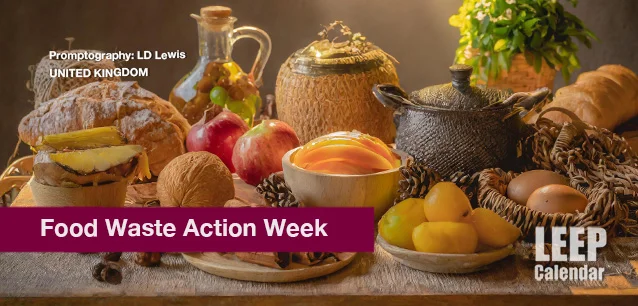 AD
AD
Today is: January 12
Scroll to explore events active on this date.
Additional Events on LEEP
LEEP INK FEATURES

August? Absolutely!
In August, we live through the Dog Days of Summer. It's hot and often humid, and those who can leave for better climates do. Down south, winter is in full force. August is also known as "the ...

In The Heat of July: July 2025 Events
Is it hot enough (or cold enough if you're below the equator) for you yet? There is actually a day for that! Like every month, I pick a diverse collection of events you may or may not know about. This ...

May Blooms: Events in May 2025
Along with October, May is one of the most densely packed months of the year. It's before the summer humidity and the last whole month of the school year. The weather is warming in t...
About Food Waste Action Week
Safety & Security , United Kingdom & Ireland
Ends: Mar 24, 2024
DESCRIPTION:
Food Waste Action Week in the United Kingdom is a significant campaign aimed at tackling the issue of food waste, a growing concern with substantial environmental implications. Launched by the Waste and Resources Action Programme (WRAP), a UK-based charity and advisory body, this initiative seeks to raise awareness about the impact of food waste and encourage actions to reduce it.
The history of Food Waste Action Week began with WRAP's commitment to environmental and sustainability issues. Recognizing that household food waste contributes significantly to carbon emissions, WRAP initiated this annual event to educate the public and promote change. The week focuses on providing practical tips and strategies for households to minimize food waste, thereby reducing their environmental footprint.
During Food Waste Action Week, homeowners are encouraged to focus on key areas in their homes where food waste commonly occurs:
Refrigerator: Often the primary site for food waste, the fridge should be regularly monitored. Keeping it organized, understanding how to store different foods properly, and regular checks for items nearing expiration dates can significantly reduce waste.
Pantry and Cupboards: Arrange dry goods and canned items in pantries and cupboards so that older items are used first. Clear labeling can prevent overbuying and waste.
Freezer: Freezing food can extend its life, but it's important to label and date frozen items and rotate them to ensure they are used before becoming freezer-burned.
Meal Planning and Shopping Lists: Planning meals in advance and creating shopping lists can reduce impulsive buys that often lead to excess and unconsumed food.
Portion Control: Cooking and serving appropriate portion sizes helps reduce leftovers.
Composting: For unavoidable waste like vegetable peelings and eggshells, composting is an effective way to recycle these items back into the garden instead of sending them to landfills.
Understanding Expiration Dates: Educating about the difference between 'use-by,' 'sell-by,' and 'best before' dates can help make informed food safety and usability decisions.
Food Waste Action Week is about raising awareness and driving real change in behaviors at the household level. By focusing on these key areas, homeowners can play a crucial role in reducing food waste, contributing to the broader goal of environmental conservation and sustainability. This initiative underscores the importance of individual action in tackling global issues like food waste and climate change.
VIDEOS
SUPPORTING DOCUMENTS
Currently, this event does not have supporting documents.
ADDITIONAL IMAGES
Currently, this event does not have supporting images.
Where would you like to go now?
 AD
AD


/footer-logo.svg)
